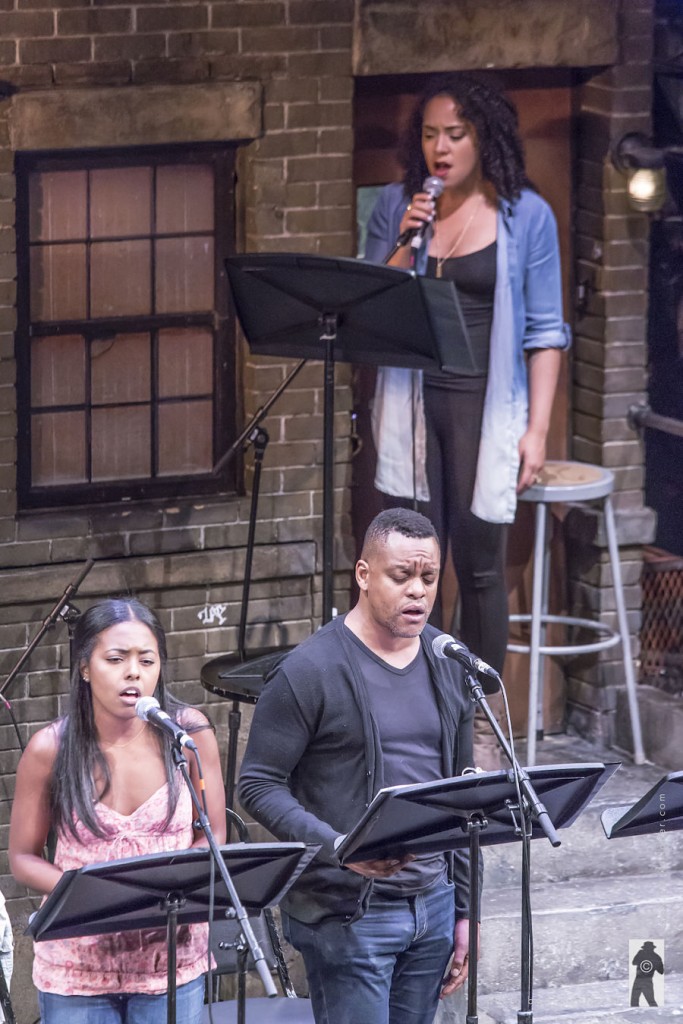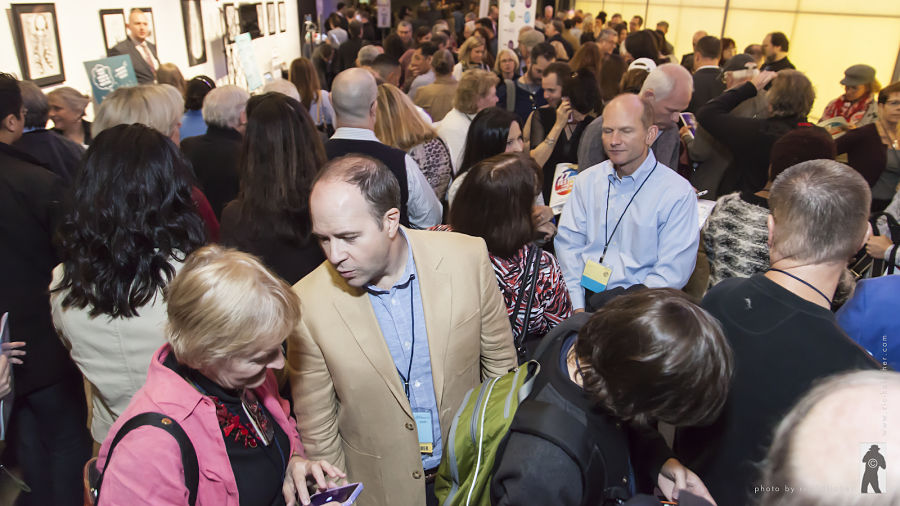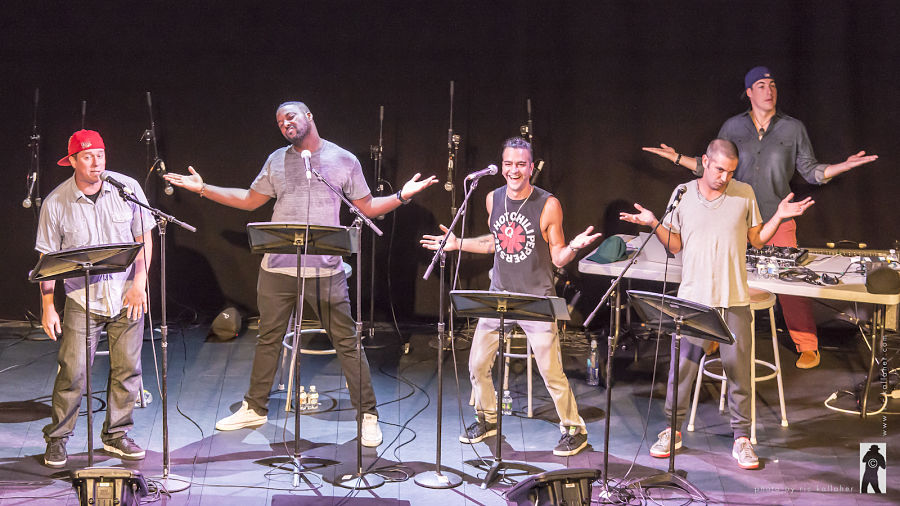There are many ways a new musical can be born: at an industry workshop or reading, a concert performance, or with the writers blindly submitting a draft and demos to a theatre. But what if there was a one-stop new-musical shop, where producers, artistic directors, and even academics could gather for two days to see a curated sampler of eight musicals of all shapes and sizes?
That’s exactly what the National Alliance for Musical Theatre’s annual festival is designed to be. For two days at New World Stages in New York City, the nonprofit organization presents 45-minute excerpts of eight new musicals for about 600 people—organization members, non-members, media, and even fans—for consideration in season programming, developmental productions, or just plain enjoyment.
“It’s a really good way to come out with a show, to let people know that you’re working on something,” said Kyle Jarrow, whose musical Hostage Song was part of the 2009 festival. This year he and composer Duncan Sheik had their new show, Noir, featured at the event. “At this point in the development of the piece, we thought it would be a good way to let the world know about it.”

The 2015 festival—the organization’s 27th—took place Oct. 15–16. More than 220 writing teams submitted scripts and demos to be considered for the final eight slots. Each group that applies needs to have a professional endorsement, either from a member of NAMT or an outsider. A large sub-committee of the NAMT board does the first pass and narrows the entries down, and about a third of them move onto Round Two. The core festival committee, which selects the final group, is comprised of about 14 leaders from membership organizations.
“The entire process throughout every round is blind,” explained NAMT executive director Betsy King Militello. “You can be reading something by a group of college seniors, or you could be reading something by a Tony-winning playwright. It gives a real integrity and meritocracy to the process.”
At the 2015 event, the talent indeed ranged from veritable unknowns to known quantities like Sheik and the Q Brothers. Militello insists that she tries to keep a diversity in the final projects in all areas.
“We can’t have eight shows that are all big and all sunshine, and on the flip side we can’t have eight shows that are all four-person ensembles,” Militello said, adding that she also wants a mix of musical styles and next-step opportunities for the work.
This year’s shows included a touching story about a young boy and his imaginary friend, a hip-hop take on Othello, a film noir-style mystery, a comedy set in the video game world, a dark comedy at an apocalyptic theatre, a Great Depression-era gothic fantasy, a tragedy about two immigrants in New York, and a fantastical story of a young boy’s mysterious adventure.
“It’s sort of a marketplace for people looking for new work to develop,” said Will Van Dyke, who was at the festival for the first time with his musical Imagine Harry, which he wrote with Jeff Talbott. “Ultimately, a goal is always production, but for us specifically, the goal is to find a place that would foster it from where we are now to a production.”
The NAMT presentations are slightly different than standard industry workshops and readings. There can be only 20 hours of rehearsal, and each presentation is capped at 45 minutes.
“You have to keep your eye on the clock!” said director John Simpkins, who helmed Legendale. This year marks his third year at the festival as a director, and he’s also participated for many years as a member through his position as artistic director of TriArts Sharon Playhouse in Connecticut.
Another rule of the presentation is that the writers of the show cannot appear in their show’s presentation, though this year the festival granted an exception to the Q Brothers, who wrote and performed in their hip-hop Shakespeare riff Othello: The Remix (the festival has made a few other exceptions over the years, and is weighing a change to the rule going forward). The rapping siblings also fell into another rare category at the event in that their show has already had a few full productions, including at Chicago Shakespeare Theater. This presented some challenges, as the NAMT readings are required to be performed at music stands with no staging or choreography.
“We had to strip it back a little bit,” conceded JQ. “It actually made you rethink some of your choices as a writer. Any performance teaches you something, and this was no different.” And though the show has had productions, the brothers’ goal with NAMT was to get one in New York. Said GQ, “After that, we’ll license it out to anyone who wants it.”
Commercial producers, nonprofit leaders, and academic institutions attend the festival, as all are a part of NAMT’s membership. Jarrow said that while he and Sheik are talking to a commercial producer about Noir, he could imagine the show starting as an enhanced production at a nonprofit before going commercial. “You try to make the best show you can, and I think generally things that are good find a home,” Jarrow added.

And writers whose shows don’t make it into the final eight are also invited to perform at NAMT through other venues. Branden Huldeen, the festival’s producing director, invites writers he knows and writers who were considered for the festival to perform as part of either the songwriters’ cabaret or the songwriters’ showcase. The cabaret took place on both days over the lunch hour, with writing teams presenting songs from some of their shows. Tony winner Victoria Clark hosted the showcase on Thursday in one of the performance spaces. She talked to the writers about their work before they had some of their songs performed.
Scotty Arnold and Alana Jacoby were semi-finalists this year—their second time applying to the festival—with Mortality Play, and they presented two songs from the show as part of the showcase. “It’s a great matchmaking environment,” said Jacoby. “It’s also great that people come to the city for this specifically so we’re reaching a much wider audience.”
The networking atmosphere between presentations is just as—if not more—important than the shows themselves. After each presentation, the writers go to a table outside the theatre and exchange demos for business cards. There are also happy hours and a closing night party where folks can mingle. These, as much as the performances, are where valuable connections are made that can further a work’s future.
Some shows that have been a part of NAMT that have had success after their presentations include Come From Away, which played at La Jolla Playhouse this past summer and begins performances next week at Seattle Rep; Nobody Loves You, which played at both New York’s Second Stage and the Old Globe in San Diego; Pregnancy Pact, which had a production at the Weston Playhouse; and It Shoulda Been You, which played at the George Street Playhouse before opening on Broadway last season.
There is no one NAMT style, though. As the definitions and rules of musical theatre are changing, so is the festival.
“We don’t generally associate with musical theatre in a traditional sense,” said GQ. “NAMT makes a conscious effort to expand the boundaries of what is considered to be musical theatre, and we are super-psyched to be one of those factors that is allowing them to do that.”


